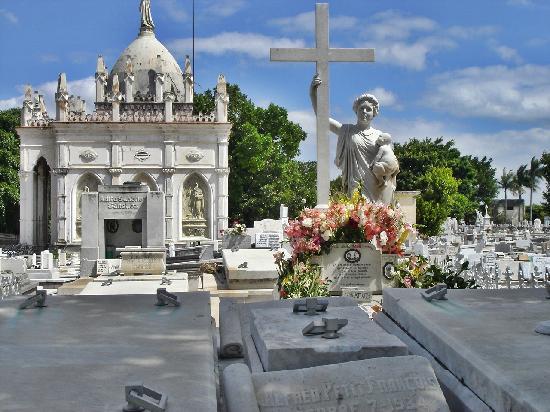
The crematorium located in the town of Guanabacoa is a clean building with an amiable and personalized treatment. Anabel, 49, has no complaints. The last wish of her mother, who died of a terminal cancer, was that they cremate her body.
But the crematorium price made Anabel jump like a spring. “A couple of years ago, when they incinerated my father, we paid 50 pesos (2 dollars). Now the service raised its price to 300 pesos (13 dollars), which seems excessive to me”.
The silent rise in prices of funeral services promises to grow. On an island where the rumors are more credible than the news published by the press, the possible announcement of the readiness of the State to collect for wakes — until now, gratis — are attracting strong comments.
In his zeal to make meticulous reductions in these awkward official subsidies, which according to its auditors are burdening the good function of the Cuban economy, President Raul Castro hopes to eliminate — all of a sudden — the ‘gratuities’, one of the flags flown 52 years ago by Fidel Castro’s revolution.
In that future designed by technocrats in olive green, we’ll say goodbye to the ration book and 1,300,000 workers will be laid off. Also, benefits subsidized by the State, like the movie theaters, sports events, and funeral services will have a price increase.
The clue was given by the independent journalist Moises Leonardo Rodriguez in a note published in Cubanet. According to Rodriguez, there would be a charge between 1,500 and 1,800 pesos (65 to 75 dollars) for funeral assistance.
That quantity of money is equivalent to seven times the minimum monthly salary of 225 pesos. Sources consulted in the Rivero Funeral Parlor, situated in the Vedado section of Havana, confirmed the news.
“Besides the caskets, they’ll charge for veils, lights, and they will rent out the chairs and armchairs. The hearse will also be more expensive”, the funeral home employees assured.
During the 60s, the Castro government, who by then had a populist argument in favor of the poor, intervened in funeral parlors and their services were presented for free.
Those were other times. The urgent needs to slow the fall of the fragile Cuban economy have provoked heavy-handed and Draconian measures, similar to shock therapies applied in capitalist societies.
The news from the independent journalist spread fast among Cubans with internet access. Elena, employed by a food manufacturer, commented that the State tourniquet to contain the hemorrhage of this crisis is too tight.
“In one year, it’s difficult to change the mentalities of people accustomed to living with their mouths open, waiting for the State to give you your pablum. The sudden elimination of numerous subsidies, besides bringing discontent, might transform itself into a spark that could set off open, massive protests. The cases of Egypt and Tunisia are an example”, Elena underlines.
Another big problem that’s been noticed is that the government makes no mention of a rise in salaries, which would compensate in part for the suppression of subsidies and dangerously shooting prices.
In a country where two currencies circulate, replete with material shortages and where the workers’ salaries are a joke, it is not only difficult now to confront the cost of living. Now death also has a high cost.
February 26 2011
